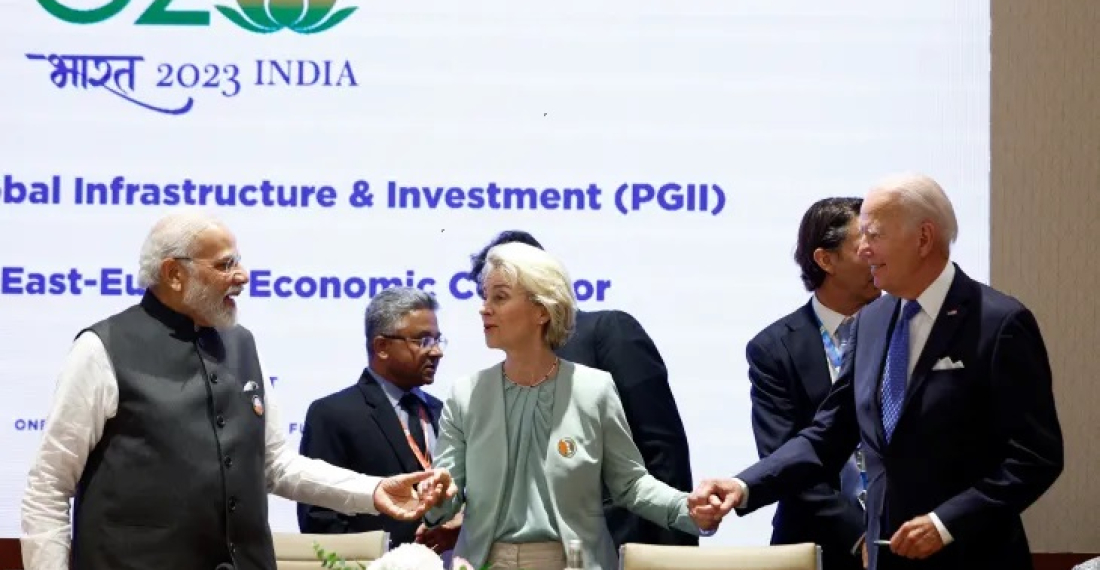India, the European Union, the United States and Saudi Arabia announced a mega deal to establish the India-Middle East-Europe Economic Corridor (IMEC) at an event on the sidelines of the G20 summit on Saturday (9 September). The leaders of India, Italy, France, Germany, the United States, the United Arab Emirates, the European Union and Saudi Arabia signed the memorandum of understanding.
While announcing the corridor at the G20 summit, Prime Minister Narendra Modi said that IMEC will usher in a new chapter in global connectivity and sustainable development. He also stated that the corridor would act as a "major medium of economic integration between India, West Asia, and Europe”.
The project will be developed under the G7 nations’ Partnership for Global Infrastructure Investment (PGII) initiative. PGII aims to bridge the infrastructure gap in developing countries. The new IMEC project is being seen as a response to China’s Belt and Road initiative. While the cost of the project has not been officially announced, reports indicated that the countries might spend around $20 billion on developing the corridor.
The new project will consist of two corridors. The east corridor will connect India with Gulf countries and the northern corridor will connect Arabian Gulf with Europe.
The corridors will consist of a ship-to-rail transit network to facilitate cost-effective transport routes for the countries. The memorandum of understanding read,” It will enable goods and services to transit to, from, and between India, the UAE, Saudi Arabia, Jordan, Israel, and Europe.” The countries also plan to lay down a cable network for electricity and digital connectivity along with pipes for clean hydrogen export.
EU President Ursula von der Leyen said that IMEC will be the most direct connection between the countries and it is expected to cut travel time by 40 per cent.
Indian Prime Minister Narendra Modi, the host of the G20 summit said: "Today, as we embark upon such a big connectivity initiative, we are sowing the seeds for future generations to dream bigger."
US president Joe Biden said it was a "real big deal" that would bridge ports across two continents and lead to a "more stable, more prosperous and integrated Middle East." He said at an event announcing the pact that it would unlock "endless opportunities" for clean energy, clean electricity, and laying cable to connect communities.
The deal will benefit low and middle-income countries in the region, and enable a critical role for the Middle East in global commerce, Jon Finer, the U.S. deputy national security adviser, told reporters at the bloc's annual summit in New Delhi.
It aims to link Middle East countries by railway and connect them to India by port, helping the flow of energy and trade from the Gulf to Europe, cutting shipping times, costs and fuel use.
A memorandum of understanding on the India-Middle East-Europe Economic Corridor, or IMEC, was signed by the European Union, India, Saudi Arabia, the United Arab Emirates, the U.S. and other G20 partners.
IMEC is envisioned to consist of two separate corridors with an east corridor connecting India to the Arabian Gulf, and a northern corridor connecting the Arabian Gulf with Europe, according to the MOU.
Along the railway route, participants intend to lay cable for power and data lines, as well as pipeline for hydrogen derived from renewable energy for use in power generation.
French President Emmanuel Macron said the pact offers opportunities for manufacturing, innovation and people. "But our intention is to make it real, and to be sure that after this commitment we have concrete results," he said at the event. No immediate details of the value of the deal were available.
From the U.S. viewpoint, Finer added, the deal helps "turn the temperature down across the region" and "address a conflict where we see it".
source: commonspace.eu with agencies
photo: Indian prime minister Modi, US president Biden, and European Commission president von der Leyen at the launch of IMEC in Inida on 9 September 2023






